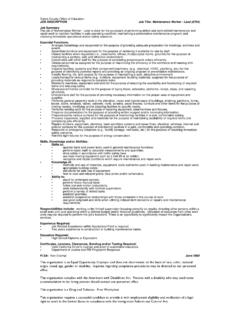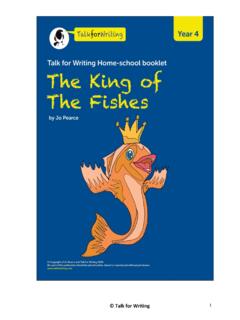Transcription of Constellation Legends - Tulare County Education Office
1 Constellation Legends by Norm McCarter Naturalist and Astronomy Intern SCICON Andromeda The Chained Lady Cassiopeia, Andromeda s mother, boasted that she was the most beautiful woman in the world, even more beautiful than the gods. Poseidon, the brother of Zeus and the god of the seas, took great offense at this statement, for he had created the most beautiful beings ever in the form of his sea nymphs. In his anger, he created a great sea monster, Cetus (pictured as a whale) to ravage the seas and sea coast. Since Cassiopeia would not recant her claim of beauty, it was decreed that she must sacrifice her only daughter, the beautiful Andromeda, to this sea monster.
2 So Andromeda was chained to a large rock projecting out into the sea and was left there to await the arrival of the great sea monster Cetus. As Cetus approached Andromeda, Perseus arrived (some say on the winged sandals given to him by Hermes). He had just killed the gorgon Medusa and was carrying her severed head in a special bag. When Perseus saw the beautiful maiden in distress, like a true champion he went to her aid. Facing the terrible sea monster, he drew the head of Medusa from the bag and held it so that the sea monster would see it. Immediately, the sea monster turned to stone. Perseus then freed the beautiful Andromeda and, claiming her as his bride, took her home with him as his queen to The Water Bearer The name most often associated with the Constellation Aquarius is that of Ganymede, son of Tros, King of Troy.
3 Ganymede was an extremely handsome young man, the most handsome the gods and goddesses had ever seen. While attending to his father s flocks on Mount Ida, Ganymede caught the attention of Zeus. Zeus sent his messenger eagle, Aquila, down to earth with instructions to bring Ganymede back up to Mount Olympus. On Mount Olympus, Ganymede served the gods by bringing them water whenever they needed it. He also served as cup bearer to Zeus. He was honored for his service by Zeus, who placed a Constellation called Aquarius, which means water carrier, among the The Eagle In Greek mythology, the eagle was associated with Zeus (Jupiter), either as a servant who carried Zeus messages down to humans on Earth or as a disguise taken by Zeus in order to avoid his wife Hera when he was up to some mischief.
4 One story of Aquila s service to Zeus was that of Ganymede, who was a very gentle, kind shepherd and the most handsome mortal the gods and goddesses had ever seen. One day, the great eagle Aquila swooped down from the sky and, landing near the startled Ganymede, told him that Zeus had sent him to carry Ganymede to Mount Olympus. And so, climbing up on the eagle s broad back, Ganymede was taken up to Mount Olympus where he served the gods by bringing them The Ram Athamas, the legendary king of Thessaly, had two children, Phrixus and Helle. He had remarried and Ino, the children s stepmother, began to treat them very badly.
5 They were treated so cruelly that Hermes took pity on them and sent a magical ram to take them away and escape their stepmother s wrath. Mounted on the ram s back, the children flew over land and sea to the east. Unfortunately, Helle failed to get a good hold on the fleece of the ram and as they flew over the strait that separates Europe and Asia, she fell off and was drowned in the sea far below. That sea is called Hellespont to this day in honor of her memory. Phrixus landed safely at Colches, which is on the edge of the Black Sea. In gratitude for his safe deliverance, Phrixus sacrificed the ram and gave its Golden Fleece to the king of that country.
6 In honor of the ram s great sacrifice in saving the children, Zeus placed the ram s Constellation , Aries, in the night sky. Auriga The Charioteer The Constellation Auriga is mentioned in two ancient stories. The first, relating to a charioteer, is that of Auriga, the crippled son of Vulcan and Minerva, who invented a four-horse chariot in order to get himself around. This became such an important invention that Zeus placed the first chariot into the skies with the other constellations . The second story, which is the older of the two, referred to Auriga as a gentle shepherd who, after finding one of his pregnant goats missing, went out into the hills and searched until he found her stranded on a rocky ledge with her two new kids.
7 Placing her across his shoulders and carrying the two kids in his left arm, he returned to the rest of the herd. Some stories relate how the two kids commemorate the two daughters of the king of Crete who fed and cared for the infant Zeus. Bootes The Bear Driver According to the Greeks, Bootes was pictured as a mighty man. In his right hand he holds a spear, and with his left, two hunting dogs. Since he appears to be pursuing the Great Bear (Ursa Major) around the North Pole, Bootes was called The Bear Driver. The key star, Arctures, can be easily found by following the curved line formed by the handle of the Big Dipper outward to the first bright star.
8 Without doubt, Arctures was one of the first stars to be named. It was one of the few stars mentioned in the Bible, where it is referred to in the book of Job, thus giving it the name Job s star. Cancer The Crab According to Greek mythology, Hercules, Zeus son, was given 12 labors by Hera, Zeus wife, which would each test his strength and courage. Hera hoped these 12 labors would prove to Zeus that Hercules was unworthy of his love. The second of these 12 labors was to kill the Lernean Hydra, which had a long snake or dragon-like body and nine heads. If anyone succeeded in cutting off one of its heads, it would grow another one in its place.
9 In order to make sure that Hercules failed at this task (Hera was very jealous of Zeus love for Hercules), Hera sent a large crab to grab Hercules by the heel and distract him while he was fighting the Hydra. During the fight with the Hydra, Hercules, who took his nephew Iolas along, would cut off one of the Hydra s heads and Iolas would sear that neck with a torch so that no new head could grow back. Fearing that Hercules might indeed defeat the Hydra, Hera sent in the crab to grab Hercules foot. However, as the crab grabbed his foot, Hercules stomped down with his other foot and crushed the crab. He then cut the final head of the Hydra off and Iolas seared it, thus defeating the Hydra, and Hera.
10 To honor Hercules great victory and to remind Hera of her failure, Zeus placed the Constellation of Cancer the Crab in the sky. Capricorn The Sea Goat Capricorn is one of the earliest constellations and has passed through the ages virtually unchanged, depicting the front half of a goat and the tail of a fish. It is also referred to in Greek and Roman mythology as the Gateway of the Gods through which the souls of men released at death would pass to the life hereafter. According to ancient Greek Legends , Cronus was told by the oracle that one day one of his sons would grow up to be stronger than he and would eventually kill him in battle.
















